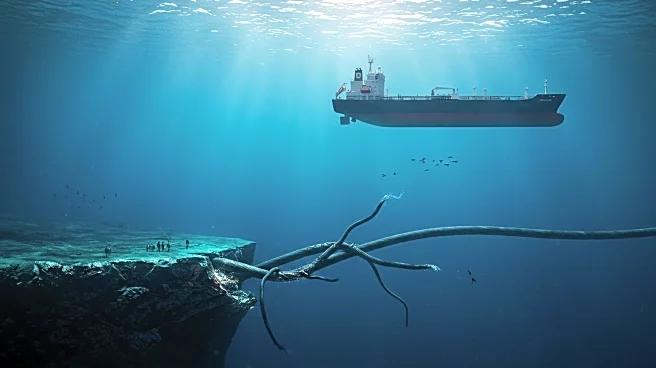What is the story about?
What's Happening?
Finland has filed criminal charges against the captain and two first officers of the Eagle S, a Cook Islands-registered oil tanker, for causing significant damage to undersea cables in the Gulf of Finland. The incident occurred on Christmas Day when the ship allegedly dragged its anchor for over 56 miles, severing five electricity and telecom cables and resulting in nearly $70 million in damages. The officers, reportedly Georgian and Indian nationals, are charged with aggravated criminal mischief. The Eagle S is suspected to be part of a 'shadow fleet' transporting Russian oil in violation of international sanctions. Finnish officials have not directly accused Russia of involvement, although the ship had recently departed from a Russian port.
Why It's Important?
The charges highlight ongoing tensions in the Baltic region, where several incidents of undersea cable damage have raised suspicions of sabotage linked to Russia. These disruptions pose serious risks to energy supply and telecommunications, critical infrastructures for Finland and its neighbors. The case underscores the broader geopolitical struggle as European nations attempt to reduce dependency on Russian energy. By imposing severe penalties, Finland aims to deter future incidents and hold accountable those involved in damaging vital infrastructure, potentially influencing international maritime practices and policies.
What's Next?
The legal proceedings against the tanker officers could set a precedent for handling similar cases in the future. Finland's actions may prompt other nations to strengthen their maritime security and surveillance to protect undersea infrastructure. The case may also lead to increased scrutiny of vessels suspected of violating sanctions, potentially affecting global oil transport dynamics. As the investigation unfolds, further diplomatic and legal responses from Russia and other involved parties may emerge.
Beyond the Headlines
The incident raises questions about the security of undersea cables, which are crucial for global communication and energy transmission. It also highlights the challenges of enforcing international sanctions and the complexities of maritime law. The case may influence future discussions on international cooperation to safeguard critical infrastructure from both accidental and intentional damage.















